from May. 1, 1865
A letter William H. Herndon to an unknown person
-
Full Title
A letter William H. Herndon to an unknown person
-
Description
A letter written about Lincoln by William H. Herndon, his friend, law partner, and biographer.
-
Source
Special Collections Research Center, University of Chicago Library
-
Rights
This item is in the public domain and may be reproduced and used for any purpose, including research, teaching, private study, publication, broadcast or commercial use, with proper citation and attribution.
-
Tags
-
Cite this Item
William H. Herndon. "A letter William H. Herndon to an unknown person". Remembering Lincoln. Web. Accessed December 16, 2025. https://rememberinglincoln.fords.org/node/1176
-
Creator
William H. Herndon
-
Date
1865-1870
from May. 1, 1865
A letter William H. Herndon to an unknown person
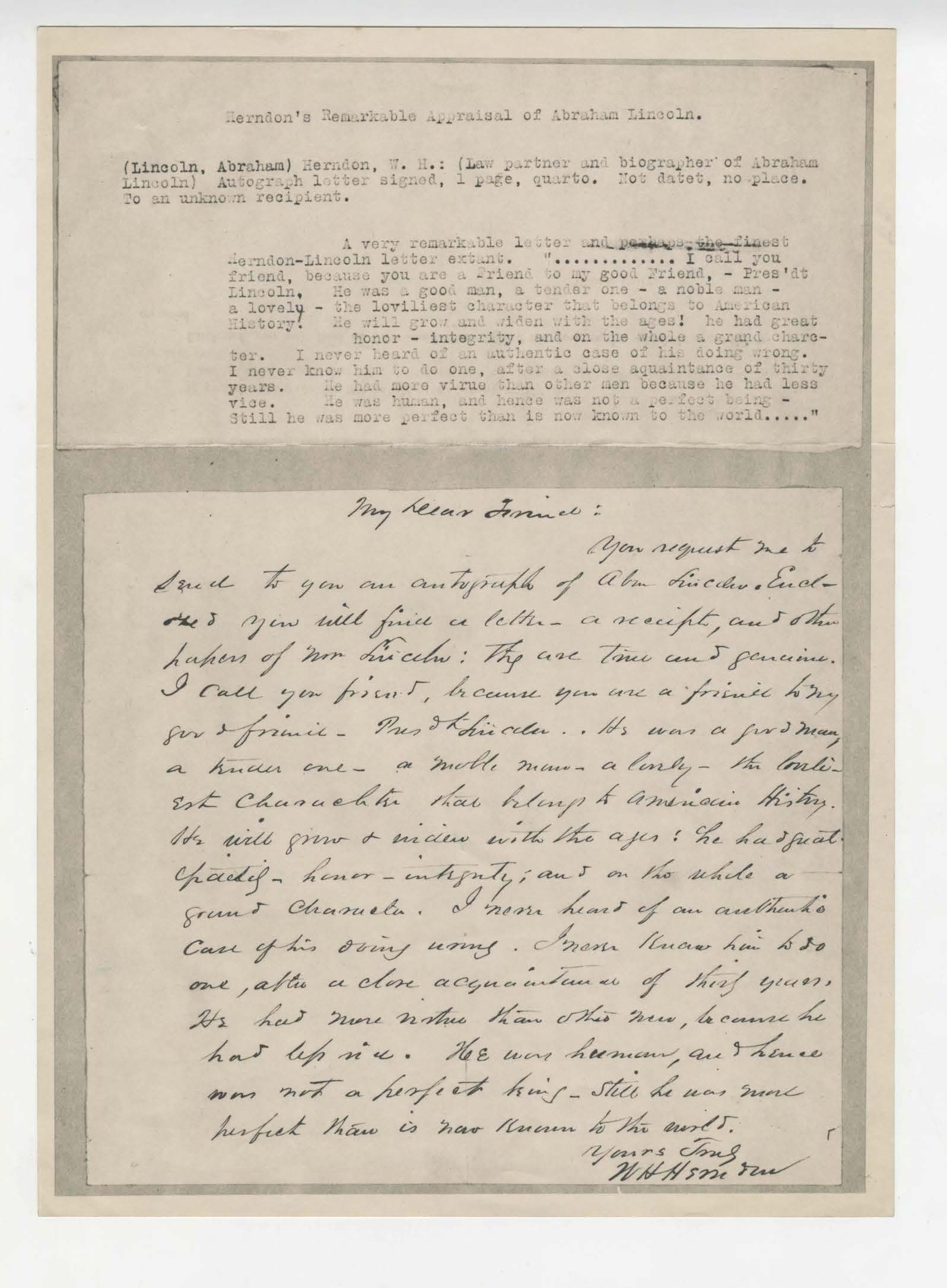
-
Description
A letter written about Lincoln by William H. Herndon, his friend, law partner, and biographer.
-
Source
Special Collections Research Center, University of Chicago Library
-
Rights
This item is in the public domain and may be reproduced and used for any purpose, including research, teaching, private study, publication, broadcast or commercial use, with proper citation and attribution.
-
Creator
William H. Herndon
-
Date
May 1, 1865
from Apr. 19, 1865
A Letter from Dr. Anson G. Henry to his wife
-
Full Title
A Letter from Dr. Anson G. Henry to his wife
-
Description
Dr. Anson G. Henry was a friend of Abraham Lincoln from Springfield who he had appointed as Surveyor General of Washington Territory during his presidency. He was in Washington following the assassination and wrote his wife about his grief and that of Mary Lincoln
-
Source
Special Collections Research Center, University of Chicago Library
-
Rights
This item is in the public domain and may be reproduced and used for any purpose, including research, teaching, private study, publication, broadcast or commercial use, with proper citation and attribution.
-
Tags
-
Cite this Item
Anson G. Henry . "A Letter from Dr. Anson G. Henry to his wife". Remembering Lincoln. Web. Accessed December 16, 2025. https://rememberinglincoln.fords.org/node/1175
-
Creator
Anson G. Henry
-
Date
April 19, 1865
from Apr. 19, 1865
A Letter from Dr. Anson G. Henry to his wife
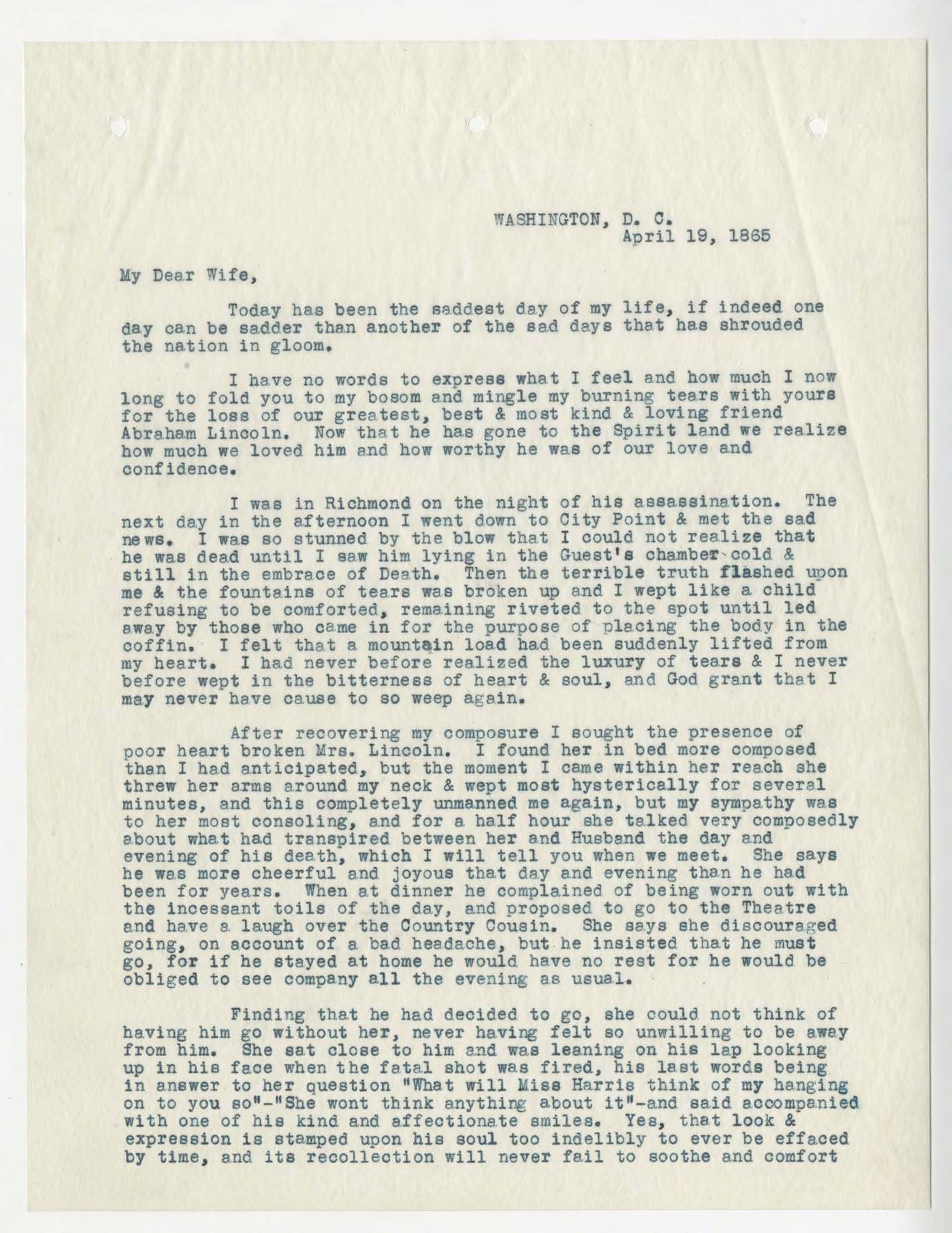
-
Description
Dr. Anson G. Henry was a friend of Abraham Lincoln from Springfield who he had appointed as Surveyor General of Washington Territory during his presidency. He was in Washington following the assassination and wrote his wife about his grief and that of Mary Lincoln
-
Source
Special Collections Research Center, University of Chicago Library
-
Rights
This item is in the public domain and may be reproduced and used for any purpose, including research, teaching, private study, publication, broadcast or commercial use, with proper citation and attribution.
-
Creator
Anson G. Henry
-
Date
April 19, 1865
from Jun. 1, 1865
Letter from Francis Bicknell Carpenter to Sanford Thayer
-
Full Title
Letter from Francis Bicknell Carpenter to Sanford Thayer
-
Description
The portrait painter Francis Bicknell Carpenter lived in the White House with the Lincolns while working on "First Reading of the Emancipation Proclamation of President Lincoln." Over a month after Lincoln's death he wrote a letter to fellow painter, Sanford Thayer, reflecting on his work in the White House and his relationship with and respect for Lincoln.
-
Transcription
653 Broadway N.Y
June 1st 1865
My Dear Thayer,
It is so long since you and I have written each other that I am in some doubt if you will recognize either the hand or the signature?
I have thought of my duty to you a great many times – but as you perhaps know I have had a great deal upon my hands during the last year and half and have had so many business letters to write that my old friends have been neglected.
I was in Washington six months, I worked so incessantly upon my large canvas, that the result was a sickness after I got the picture on exhibition which came near ending my work in this world. I was attacked with dropsy of the chest about 12 days after I opened the picture to the public. I was so sick that I have not until quite recently felt like painting in earnest. I am now hard at work again however
My extensive undertaking is likely to turn out well though the picture is full of faults. It has been very popular & is now in Chicago. It may get around to Syracuse, one of these days.
With the knowledge I have acquired, in studying and painting it, I feel that I could now take up such a subject and do much better. It was no “childs play” I assure you.
I wish you could have known Mr. Lincoln. – I remember you had a great contempt for him when I last visited you, _ but if you could have seen him as I did and realized how simple he was in his great position, how little he was affected by what people thought and said, how earnest he was to do his best for the country, how perfectly true to himself under all circumstances – never affecting a dignity he did not possess, or assuming to be anything but homely, plain, common sense, “Mr. Lincoln, of Springfield Ill.” I believe if you could have seen all this, you would have come to have a sincere respect for him. As Tennyson says, “In his simplicity he was sublime.” Now that he is gone, people begun to appreciate, not only his great tenderness of heart and real goodness of nature, but his sagacity and wisdom.
The exhibition this year is crowded with visitors as it has never been. The galleries are too narrow but on the whole the building presents a fine appearance. The pictures so-so. I have spent but little time there, as yet, and had no time to go through the catalogue carefully for you as of old but I send you a catalogue nevertheless. Can’t you come down and see for yourself.
We are living in our own house #96 West 45th st. and would be very glad to see you and Mrs. Thayer at any time.
With regard to her, as of old yours – Frank Carpenter
[Transcription by Kristina Kynaston] -
Source
Special Collections Research Center, University of Chicago Library
-
Rights
This item is in the public domain and may be reproduced and used for any purpose, including research, teaching, private study, publication, broadcast or commercial use, with proper citation and attribution.
-
Tags
-
Cite this Item
Francis Bicknell Carpenter. "Letter from Francis Bicknell Carpenter to Sanford Thayer". Remembering Lincoln. Web. Accessed December 16, 2025. https://rememberinglincoln.fords.org/node/1174
-
Creator
Francis Bicknell Carpenter
-
Date
June 1, 1865
from Jun. 1, 1865
Letter from Francis Bicknell Carpenter to Sanford Thayer

-
Description
The portrait painter Francis Bicknell Carpenter lived in the White House with the Lincolns while working on "First Reading of the Emancipation Proclamation of President Lincoln." Over a month after Lincoln's death he wrote a letter to fellow painter, Sanford Thayer, reflecting on his work in the White House and his relationship with and respect for Lincoln.
-
Source
Special Collections Research Center, University of Chicago Library
-
Rights
This item is in the public domain and may be reproduced and used for any purpose, including research, teaching, private study, publication, broadcast or commercial use, with proper citation and attribution.
-
Creator
Francis Bicknell Carpenter
-
Date
June 1, 1865
from Apr. 24, 1865
Letter to Benjamin Thackara from A. M. Thackara, April 24, 1865.
-
Full Title
Letter to Benjamin Thackara from A. M. Thackara, April 24, 1865.
-
Description
A Letter from A. M. Thackara to his father Benjamin Thackara recounting Lincoln's funeral train's stop in Philadelphia.
-
Transcription
Apr. 24, 1865
Phila April 24/65
Dear Pop
We received your letter this morning, every time I come home from the store in the evenings Mother asks me if I had heard from you. Celie has been staying at our house ever since you left. We have grand times. Yesterday the Presidents body laid in state at Independence Hall. I never saw such a crowd in my life. They were four a beast from the State House to 21st Street. At 6th Street in the morning the policemen had a hard issue of it. They had to beat the people back with their clubs. In the afternoon a regiment of the Provost Guard came down. There was a double file across the street at charge bayonets. I did not get to see the body. Those that did see it say that he looked natural. There was a grand funeral escort given “him”. But it was so dark that we could not see much of it. Mr Miskey paraded with the Union League. There is a notice at home for you to parade, but of course you cannot do it. There are two letters from Dr. Stocker, one to you and another to Mr Miskey, which one enclosing a check for the amount of your bill $59.50. He wants several things. He says he is going to send you a couple of boxes to store for him. Meree wrote an order for 2 old stogies #4988. Those large chandeliers of which we have so many. While I was writing this there was a letter came for you which I will send to Columbus. That package of lithographs for Gilfillen & Sons Hartford has returned. I was at Church last evening and heard a splendid sermon from Mr Coukling on the wages of sins is death of course he spoke about the death of our beloved President. I think that General Sherman has just about killed himself for agreeing to such terms of capitulation with Joe Johnston but however I think Genl Grant will bring it all right. He went through here on his way to North Carolina. He bid his family good bye. The people are down on Sherman now. I think that I have told you all the news I can think of now. So good bye.
From your Affectionate Son, A. M. Thackara
P.S. Write to me
[Transcription by Stephanie Dabek.] -
Source
-
Rights
This item is in the public domain and may be reproduced and used for any purpose, including research, teaching, private study, publication, broadcast or commercial use, with proper citation and attribution.
-
Tags
-
Cite this Item
A. M. Thackara. "Letter to Benjamin Thackara from A. M. Thackara, April 24, 1865.". Remembering Lincoln. Web. Accessed December 16, 2025. https://rememberinglincoln.fords.org/node/1171
-
Creator
A. M. Thackara
-
Date
April 24, 1865
from Apr. 24, 1865
Letter to Benjamin Thackara from A. M. Thackara, April 24, 1865.
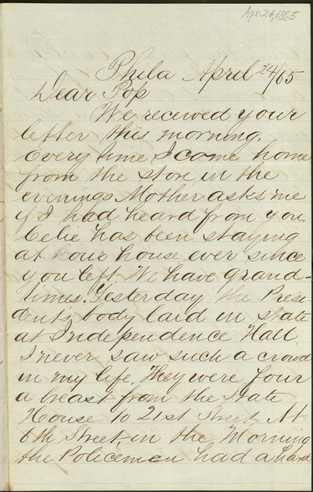
-
Description
A Letter from A. M. Thackara to his father Benjamin Thackara recounting Lincoln's funeral train's stop in Philadelphia.
-
Source
-
Rights
This item is in the public domain and may be reproduced and used for any purpose, including research, teaching, private study, publication, broadcast or commercial use, with proper citation and attribution.
-
Creator
A. M. Thackara
-
Date
April 24, 1865
from Apr. 16, 1865
Lincoln's Assassination Told by an Eye Witness
-
Full Title
Lincoln's Assassination Told by an Eye Witness
-
Description
A letter written by Julia Adelaide Shepard who was in attendance at Ford's Theatre on April 14, 1865. She wrote to her father on the 16th recounting the Lincoln Assassination. It was printed in The Century Illustrated Monthly Magazine Volume 77 (Nov. 1908 - April 1909)
-
Transcription
LINCOLN’S ASSASSINATION
TOLD BY AN EYE-WITNESS
The letter which follows was written on the date given, by Miss Julia Adelaide Shepard, now living in Ogdensburg, New York. Miss Shepard is an aunt of the artist, Mr. Charles S. Chapman, through whose good offices we are enabled to make it public the first time. – THE EDITOR.
“Hopeton” near Washington.
April 16, 1865
DEAR FATHER: - It is Friday night and we are at the theatre. Cousin Julia has just told me that the President is in yonder upper right hand private box so handsomely decked with silken flags festooned over a picture of Washington. The young and lovely daughter of Senator Harris is the only one of the party we can see, as the flags hide the rest. But we know that “Father Abraham” is there; like a father watching what interests his children, for their pleasure rather than his own. It has been announced in the papers that he would be there. How sociable it seems, like one family sitting around their parlor fire. How different this from the pomp and show of monarchial Europe. Every one has been so jubilant for days, since the surrender of Lee, that they laugh and shout at every clown-ish witticism. One of the actresses, whose part is that of a very delicate young lady, talks of wishing to avoid the draft, when her lover tells “not to be alarmed for there is no more draft, “ at which the applause is long and loud. The American cousin has just been making love to a young lady, who says she will never marry but for love, yet when her mother and herself find he has lost his property they retreat in disgust at the left of the stage, while the American cousin goes out at the right. We are waiting for the next scene.
The report of a pistol is heard…. Is it all in the play? A man leaps from the President’s box, some ten feet, on to the stage. The truth flashes upon me. Brandishing a dagger he shrieks out “The South is avenged,” and rushes through the scenery. No one stirs. “Did you hear what he said, Julia? I believe he has killed the President.” Miss Harris is wringing her hands and calling for water. Another instant and the stage is crowded – officers, policemen, actors and citizens. “Is there a surgeon in the house?” they say. Several rush forward and with superhuman efforts climb up to the box. Minutes are hours, but see! they are bringing him out. A score of strong arms bear Lincoln’s loved form along. A glimpse of a ghastly face is all as they pass along…. Major Rathbone, who was of their party, springs forward to support [Mrs. Lincoln], but cannot. What is it? Yes, he too has been stabbed. Somebody says “Clear the house,” so every one else repeats “Yes, clear the house.” So slowly one party after another steals out. There is no need to hurry. On the stairs we stop aghast and with shuddering lips – “Yes, see, it is our President’s blood” all down the stairs and out upon the pavement. It seemed sacrilege to step near. We are in the street now. They have taken the President into the house opposite. He is alive, but mortally wounded. What are those people saying, “Secretary Seward and his son have had their throats cut in their own house.” Is it so? Yes, and the mur-derer of our President has escaped through a back alley where a swift horse stood awaiting him. Cavalry come dashing up the street and stand with drawn swords before yon house. Too late! too late! What a mockery armed men are now. Weary with the weight of woe the moments drag along and for hours delicate women stand cling-ing to the arms of their protectors and strong men throw their arms around each other’s necks and cry like children, and passing up and down enquire in low agon-ized voices “Can he live? Is there no hope?” They are putting out the street lamps now. “What a shame! not now! not to-night!” There they are lit again. Now the guard with the drawn swords forces the crowd backward. Great, strong Cousin Ed says “This unnerves me; let’s go up to Cousin Joe’s.” We leave Julia and her escort there and at brother Joe’s gather together in an upper room and talk and talk with Dr. Webb and his wife who were at the theatre. Dr. W. was one of the surgeons who answered the call. He says “I asked Dr. ____ when I went in what it was, and putting his hand on mine he said, “There!” I looked and it was ‘brains.’ “
After a while Julia and Mr. W came in and still we talked and listened to the cavalry rushing through the echoing street. Joe was determined to go out, but his wife couldn’t endure the thought of any one going out of the house. It was only in the early hours of the dawn that the gentlemen went to lie down, but Julia sat up in a rocking chair and I lay down on the outside of the bed beside Cousin Ginny for the rest of the night, while Cousin Joe and his wife’s young brother sat nodding in chairs opposite. There were rooms waiting for us but it seemed safer to be together. He was still living when we came out to Hopeton, but we had scarcely choked down our break-fast next morning when the tolling bells announced the terrible truth.
Last Thursday evening we drove to the city, and all along our route the city was one blaze of glorious light. From the humble cabin of the contraband to the brilliant White House light answered light down the broad avenue. The sky was ablaze with bursting rockets. Calcium lights shone from afar on the public buildings. Bonfires blazed in the streets and every device that human Yankee ingenuity could suggest in the way of mottoes and decoration made noon of midnight. Then as candles burned low and rockets ceased, we drove home through the balmy air and it seemed as though Heaven smiled upon the rejoic-ings, and Nature took up the illumination with a glory of moonlight that tran-scended all art.
To-day I have been to church through the same streets and the suburbs with the humble cottages that were so bright that night shone through the murky morning, heavy with black hangings, and on and on, down the streets only the blackness of darkness. The show of mourning was as universal as the glorying had been, and when we were surrounded by the sol-emn and awe-stricken congregation in the church, it seemed as through my heart had stopped beating. I feel like a fright-ened child. I wish I could go home and have a good cry. I can’t bear to be alone. You will hear all of this from the papers, but I can’t help writing it for things seen are mightier than things heard. It seems hard to write now. I dare not speak of our great loss. Sleeping or waking, that terrible scene is before me.
[Transcription by Alicia B., Ford's Theatre Society.] -
Source
-
Rights
This item is in the public domain and may be reproduced and used for any purpose, including research, teaching, private study, publication, broadcast or commercial use, with proper citation and attribution.
-
Tags
-
Cite this Item
Julia Adelaide Shepard. "Lincoln's Assassination Told by an Eye Witness ". The Century Company, New York. Remembering Lincoln. Web. Accessed December 16, 2025. https://rememberinglincoln.fords.org/node/1169
-
Creator
Julia Adelaide Shepard
-
Publisher
The Century Company, New York
-
Date
April 16, 1865
from Apr. 16, 1865
Lincoln's Assassination Told by an Eye Witness
-
Description
A letter written by Julia Adelaide Shepard who was in attendance at Ford's Theatre on April 14, 1865. She wrote to her father on the 16th recounting the Lincoln Assassination. It was printed in The Century Illustrated Monthly Magazine Volume 77 (Nov. 1908 - April 1909)
-
Source
-
Rights
This item is in the public domain and may be reproduced and used for any purpose, including research, teaching, private study, publication, broadcast or commercial use, with proper citation and attribution.
-
Creator
Julia Adelaide Shepard
-
Publisher
The Century Company, New York
-
Date
April 16, 1865
from Apr. 15, 1865
Letter from "Mary" to "Sister"
-
Full Title
Letter from "Mary" to "Sister"
-
Description
In this Letter a young woman, Mary, living in Washington, D.C. writes her sister, expressing her grief over Lincoln's assassination and tells of the atmosphere of mourning in the city. She goes on to relate her own account of the night of the assassination.
-
Transcription
Saturday Morning
Washington April 15th 1865
My Dear Sister
Long ere this reaches you the news of the Nations terrible calamity will have flashed to the remotest corner of the United States of the dastardly murder of our dearly beloved President not in Richmond among his enemies but in Washington and among his avowed friends. The heart of the an nation throbs with greif at a loss it cannot soon repair but if you could look into the faces of those here today you would see that he was loved most dearly by those who knew him best. I have just passed in sight of the house where little less than an hour ago the nations heart and life ceased to beat for its welfare. Oh the agony depicted on the faces of that crowd. Men actualy tearing their hair from very greif and agony. The state of feeling is such that it is impossible to tell what it may lead to after what is past it is not safe to judge what a day may bring forth. The streets are patroled to keep the people (and its not the roughs) from assasinating every known simpathizer with the rebelion. The whole city is being draped in the heaviest mourning the bells are tolling and every-thing and every-body wears the sadest aspect a human eye ever looked upon.
I was at Grovers Theatre at the time this desperately wicked act was perpetrated at Fords. The alarm was given and instantly the people rushed to the doors supposing the building was on fire people were thrown down stairs and the wildest confusion prevailed. I was never more frightend in my life yet I stood back thinking it was as well to stand my chance of escaping the fire as to be killed in the dense crowd when the excitement had subsided the audience took their seats without knowing what had occured and the play went on for about 15 minutes when the manager came forward and announced that the President had been assasinated and a scene ensued beyond description strong men wept like little children it was a scene which I shall remember to my latest breath. there were few pillows that were not wet with tears of true sorrow while none were visited with sleep, of those who knew of it words would fail to express the horror and indignation which pervades the entire community
What a change in one short day. Yesterday all was bright and joyous today, gloom and sorrow cover a nation.
Yesterday was a lovely day, today is dark and cloudy. It seems as if the sun refused to shine on the dark deed.
I must close for I am nervous and hardly know how I have written what I have. I have changed my boarding place so you must direct to the pension Office give my love to Mother write me if she is not well for I have felt worried since her last letter she wrote so sadly. write soon. from yours
Off, Mary
-
Source
National Park Service, Ford's Theatre National Historic Site
-
Rights
This item is in the public domain and may be reproduced and used for any purpose, including research, teaching, private study, publication, broadcast or commercial use, with proper citation and attribution.
-
Tags
-
Cite this Item
Mary . "Letter from "Mary" to "Sister"". Remembering Lincoln. Web. Accessed December 16, 2025. https://rememberinglincoln.fords.org/node/1131
-
Creator
Mary
-
Date
April 15, 1865
from Apr. 15, 1865
Letter from "Mary" to "Sister"

-
Description
In this Letter a young woman, Mary, living in Washington, D.C. writes her sister, expressing her grief over Lincoln's assassination and tells of the atmosphere of mourning in the city. She goes on to relate her own account of the night of the assassination.
-
Source
National Park Service, Ford's Theatre National Historic Site
-
Rights
This item is in the public domain and may be reproduced and used for any purpose, including research, teaching, private study, publication, broadcast or commercial use, with proper citation and attribution.
-
Creator
Mary
-
Date
April 15, 1865
from Apr. 25, 1865
Sir Charles Hastings Doyle to Ulysses S. Grant
-
Full Title
Sir Charles Hastings Doyle to Ulysses S. Grant
-
Description
In this letter from Sir Charles Hastings Doyle, a friend of Ulysses S. Grant and major-general in command of British troops in the Atlantic area, Doyle expresses his sorrow over the assassination of Lincoln. Doyle also goes on to thank Grant for his hospitality while visiting him in Center Point, Virginia and invites Grant and his wife to visit his home in Halifax, Nova Scotia.
-
Transcription
Pray remember me most kindly to Mrs. Grant and all of your staff.
Halifax, Nova Scotia
April 25th, 1865
My Dear General,
I only returned yesterday from the Island of Bermuda, a distant part of my command, and heard, for the first time, on landing, of the glorious termination(for so it may now be called,) of your campaign against Rebeldom, and also the dreadful intelligence of the assassination of the President and attempts to murder both Mr. Seward and his son, which I heard with dismay and sorrow. Each and all of them having treated me with so much kindness upon both occasions of my visiting Washington - There seems to me to be every probability of the recovery of the two latter, and I hope if their lives are spared, you will kindly, when they are well enough to see you, express to them my very sincere condolences upon all the sufferings they have undergone but, the chief cause for my taking up my pen is, to offer you my very sincere congratulations upon your continuous and glorious successes, How much I should have liked to remain another fortnight with you to have been an eye witness of this wind up of your Campaign. You have gained imperishable honor and glory, and I hope you will live to enjoy them for many a long year to come - In conclusion I have only to remind you of your promise to pay me a visit, and to bring Mrs. Grant with you, that I may have an opportunity of repaying, in part at any rate, the kindness and hospitality you so obligingly bestowed upon me - I hope, the campaign being now over, there can be no doubt of your being able to carry your promise into effect - when you are able to make up your mind upon the subject you must let me know, that I may not be absent from home when you come
-Yours Sincerely Hastings Doyle General -
Source
-
Rights
This item is in the public domain and may be reproduced and used for any purpose, including research, teaching, private study, publication, broadcast or commercial use, with proper citation and attribution.
-
Tags
-
Cite this Item
Sir Charles Hastings Doyle. "Sir Charles Hastings Doyle to Ulysses S. Grant". Remembering Lincoln. Web. Accessed December 16, 2025. https://rememberinglincoln.fords.org/node/1130
-
Creator
Sir Charles Hastings Doyle
-
Date
April 25, 1865
from Apr. 25, 1865
Sir Charles Hastings Doyle to Ulysses S. Grant
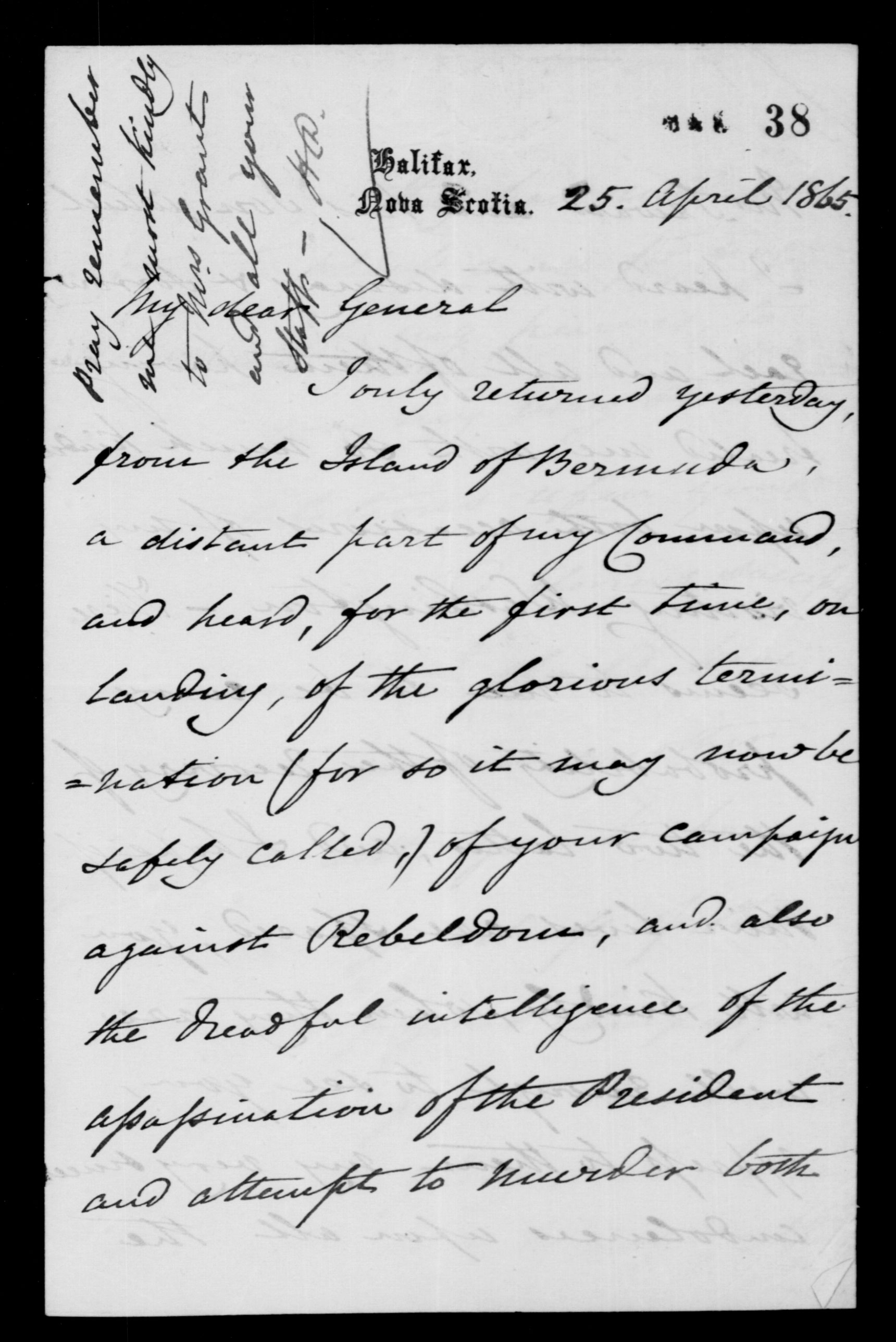
-
Description
In this letter from Sir Charles Hastings Doyle, a friend of Ulysses S. Grant and major-general in command of British troops in the Atlantic area, Doyle expresses his sorrow over the assassination of Lincoln. Doyle also goes on to thank Grant for his hospitality while visiting him in Center Point, Virginia and invites Grant and his wife to visit his home in Halifax, Nova Scotia.
-
Source
-
Rights
This item is in the public domain and may be reproduced and used for any purpose, including research, teaching, private study, publication, broadcast or commercial use, with proper citation and attribution.
-
Creator
Sir Charles Hastings Doyle
-
Date
April 25, 1865
from Apr. 17, 1865
I.F. Quinby to Ulysses S. Grant
-
Full Title
I.F. Quinby to Ulysses S. Grant
-
Description
I.F. Quinby, a former U.S. general teaching at the University of Rochester in 1865, wrote to General Ulysses S. Grant, commander of the U.S. Army, expressing sadness over the assassination of Lincoln. He also shows relief for Grant, who was originally supposed to be the Lincolns' guest at Ford's Theatre the night of the assassination.
-
Transcription
[[?]]Lincolns Assassination Rochester NY
April 17th 1865
General U.S. Grant
My Dear Grant,
While the
whole people are plunged in the
deepest grief at the death of our
wise and most excellent President
there in many led with it a feeling of
thankfulness that you for whom the
same blow was intended, so pro-
[redentially]escaped
Your hopes of the recovery of
Secretary Seward are also realized
The nations soon arise itself
Gone it's almost stupor of grief
and foreboding of other calamities
to forcible in the trace of the will give
place to confidence we the ability
of those at the head of our affairs to
bring alert the peace and hate in all
prosperity whole reserved to well
aroused before the sad event
the people hope news less from you
in the pretense hence you have accomplished
for hence in the name of personal
friendship alone, but in the light of the
nation, where I ask you to take all
wise precautions to guard against
the assassins who may be watching
their oppertunity to strike at your
life.
with the most earnest wishes that
your life may be long passed
to your family and to the nation
I remorse
Sincerely your friend
Quinby
[Transcription by: Joseph Marsteller, Rachel Engl's class, Lehigh University.] -
Source
-
Rights
This item is in the public domain and may be reproduced and used for any purpose, including research, teaching, private study, publication, broadcast or commercial use, with proper citation and attribution.
-
Tags
-
Cite this Item
Isaac Ferdinand Quinby. "I.F. Quinby to Ulysses S. Grant". Remembering Lincoln. Web. Accessed December 16, 2025. https://rememberinglincoln.fords.org/node/1127
-
Creator
Isaac Ferdinand Quinby
-
Date
April 17, 1865
from Apr. 17, 1865
I.F. Quinby to Ulysses S. Grant
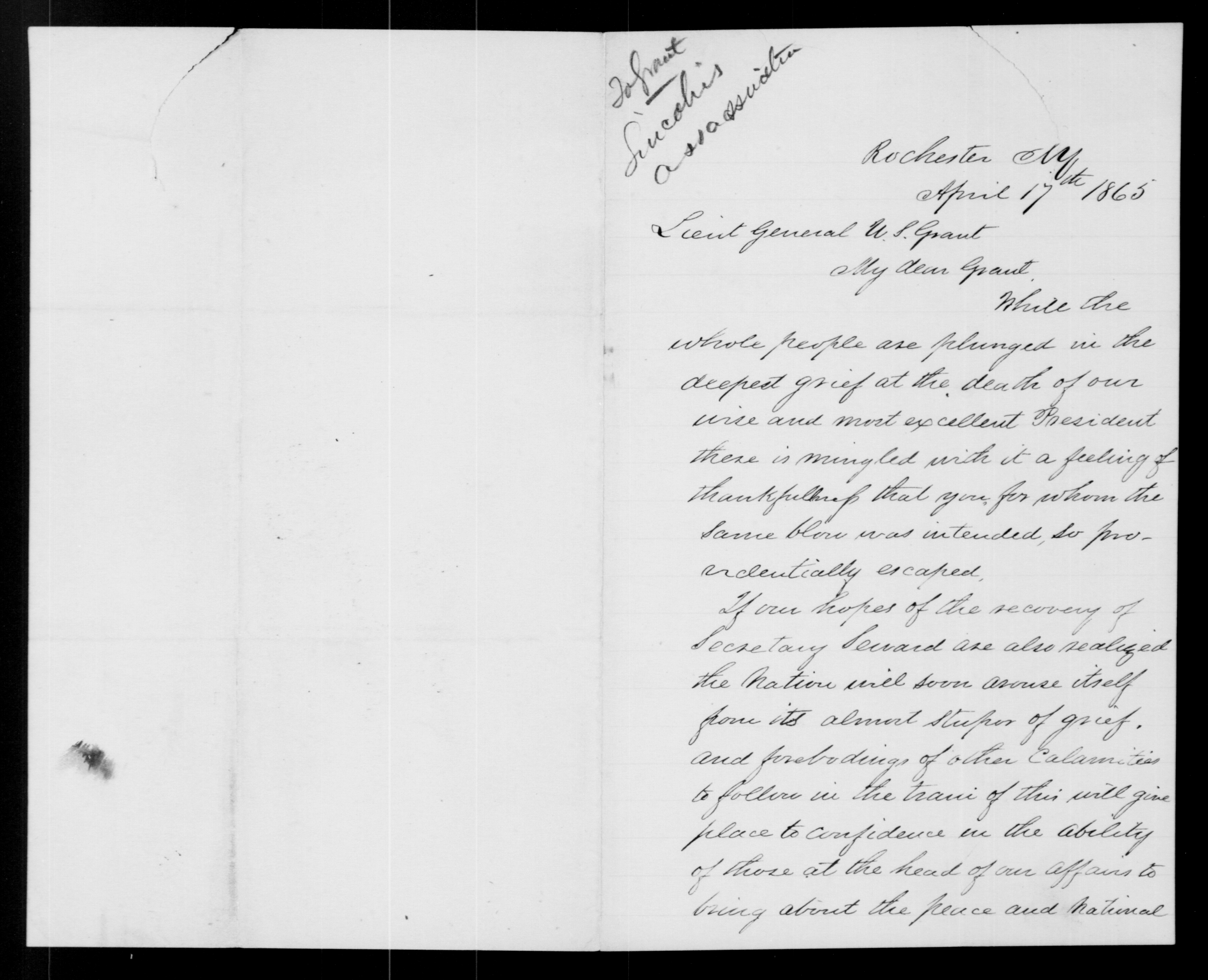
-
Description
I.F. Quinby, a former U.S. general teaching at the University of Rochester in 1865, wrote to General Ulysses S. Grant, commander of the U.S. Army, expressing sadness over the assassination of Lincoln. He also shows relief for Grant, who was originally supposed to be the Lincolns' guest at Ford's Theatre the night of the assassination.
-
Source
-
Rights
This item is in the public domain and may be reproduced and used for any purpose, including research, teaching, private study, publication, broadcast or commercial use, with proper citation and attribution.
-
Creator
Isaac Ferdinand Quinby
-
Date
April 17, 1865
from Apr. 18, 1865
President Abraham Lincoln's Washington, DC Funeral Directions and Notes
-
Full Title
President Abraham Lincoln's Washington, DC Funeral Directions and Notes
-
Description
This is a letter and invitation to Matias Romero, the minister of the Mexican Republic, to the funeral of President Abraham Lincoln at the White House. It includes the funeral procession, schedule and list of pallbearers.
-
Transcription
REPUBLIC OF MEXICO. 81
No. 3.
Mr. Hunter to Mr. Romero.
DEPARTMENT OF STATE,
Washington, April 18, 1865.
Sir: I have the honor to enclose a programme of arrangements for the obsequies of the late President. The religious services will take place at the Executive mansion at 12 o'clock to-morrow. Your attendance at half past eleven is invited.
I have the honor to be, with the highest consideration, your obedient servant,
W. HUNTER,
Acting Secretary.
Señor MATIAS ROMERO. &c., Washington, D. C.
_________
[Enclosure No. 1.]
Official arrangements at Washington for the funeral solemnities of the late Abraham Lincoln, President of the United States, who died at the seat of government on Saturday, the 15th day of April, 1865.
WAR DEPARTMENT,
Adjutant General’s Office, Washington, April 17, 1865.
THe following order of arrangements is directed:
ORDER OF THE PROCESSION.
Funeral escort—in column of march.
One regiment of cavalry.
Two batteries of artillery,
Battalion of marines.
Two regiments of infantry.
Commander of escort and staff.
Dismounted officers of marine corps, navy and army, in the order named.
Mounted officers of marine corps, navy army, in the order named.
All military officers to be in uniform, with side-arms.
CIVIC PROCESSION.
Marshal.
Clergy in attendance.
The Surgeon General of the United States army and physicians to to the deceased.
Pall-bearers. HEARSE. Pall-bearers.
Pall-bearers. Pall-bearers.
On the part of the Senate : On the part of the House :
Mr. Foster, of Conecticut, Mr. Dawes, of Massachusetts.
Mr. Morgan, of New York. Mr. Coffroth, of Pennsylvania.
Mr. Johnson, Maryland. Mr. Smith, of Kentucky.
Part ii----6
82 REPUBLIC OF MEXICO.
Mr. Yates of Illinois. Mr. Colfax, of Indiana.
Mr. Wade, of Ohio, Mr. Worthington, of Nevanda.
Mr. Conness, of California. Mr. Washburne, of Illinois.
Army: Navy:
Lieutenant General U. S. Grant Vice-Admiral D. G. Farragut.
Major General H. W. Halleck. Rear-Admiral W. B. Subrick.
Brevet Brigadier General W. A. Nichols. Colonel Jocab Zeilin, marine corps.
Civilians:
O. H. Browning. Thomas Corwin.
George Ashmun. Simon Cameron
Family.
Relatives.
The delegations of the States of Illinois and Kentucky, as mourners.
The President.
The cabinet ministers.
The diplomatic corps.
Ex-Presidents.
The Chief Justice and Associate Justices of the Supreme Court.
The Senate of the United States, preceded by their officers.
Members of the House of Representatives of the United States.
Governors of the several States and Territories.
Legislatures of the several States and Territories.
The federal judiciary and the judiciary of the several States and Territories.
The Assistant Secretaries of State, Treasury, War, Navy, Interior, and the
Assistant Postmaster General, and the Assistant Attorney General.
Officers of the Smithsonian Institution.
The members and officers of the Sanitary and Christian Commissions.
Corporate authorities of Washington, Georgetown, and other cities.
Delegations of the several States.
The reverend the clergy of the various denominations.
The clerks and employés of the several departments and bureaus, preceded by
The heads of such bureaus and their respective chief clerks.
Citizens and strangers.
The troops designated to form the escort will assemble in the avenue, north of the President’s House, and form line precisely at 11 o'clock a. m., on Wednesday, the 19th instant, with the left resting on Fifteenth street. The procession will move precisely at 2 o’clock p. m., on the conclusion of the religious services at the Executive Mansion, (appointed to commence at 12 o’clock, meridian,) when minute-guns will be fired by detachments of artillery stationed near St. John’s Church, the City Hall, and at the Capitol. At the same hour the bells of the several churches in Washington, Georgetown, and Alexandria will be tolled.
At sunrise on Wednesday, the 19th instant, a federal salute will be fired from the military stations in the vicinity of Washington, minute-guns between the house of 12 and 3 o’clock, and a national salute at the setting of the sun.
The usual badge of mourning will be worn on the left arm and on the hilt of the sword.
By order of the secretary of War:
W. A. NICHOLS,
Assistant Adjutant General
[Transcription by: Grace C., Dr. Susan Corbesero’s Class, Ellis School, Pittsburgh, Pennsylvania] -
Source
Google Books
-
Rights
This item is in the public domain and may be reproduced and used for any purpose, including research, teaching, private study, publication, broadcast or commercial use, with proper citation and attribution.
-
Tags
-
Cite this Item
William Hunter. "President Abraham Lincoln's Washington, DC Funeral Directions and Notes ". Government Printing Office. Remembering Lincoln. Web. Accessed December 16, 2025. https://rememberinglincoln.fords.org/node/1126
-
Creator
William Hunter
-
Publisher
Government Printing Office
-
Date
April 18, 1865
from Apr. 18, 1865
President Abraham Lincoln's Washington, DC Funeral Directions and Notes
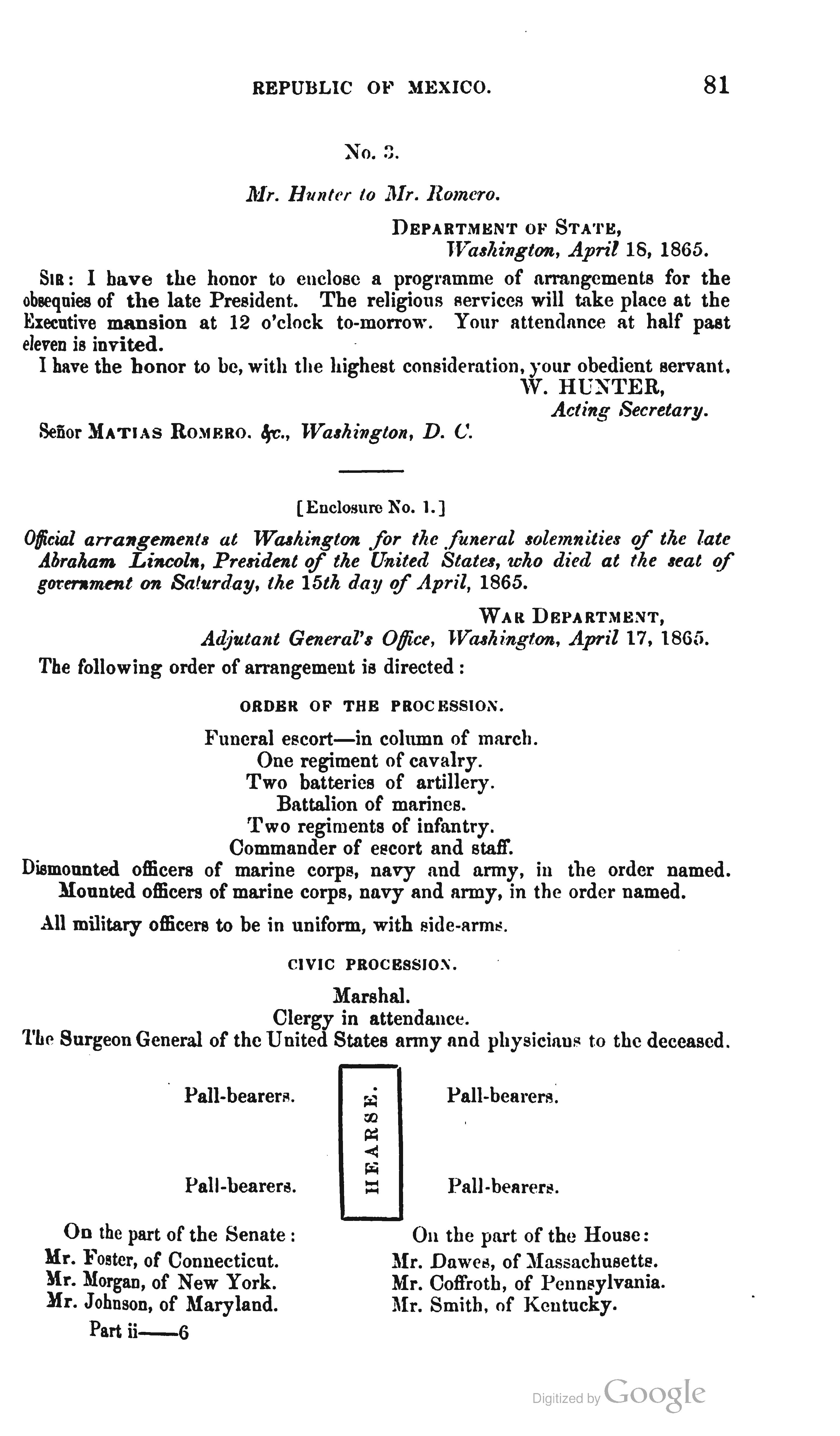
-
Description
This is a letter and invitation to Matias Romero, the minister of the Mexican Republic, to the funeral of President Abraham Lincoln at the White House. It includes the funeral procession, schedule and list of pallbearers.
-
Source
Google Books
-
Rights
This item is in the public domain and may be reproduced and used for any purpose, including research, teaching, private study, publication, broadcast or commercial use, with proper citation and attribution.
-
Creator
William Hunter
-
Publisher
Government Printing Office
-
Date
April 18, 1865
from Jul. 4, 1865
Condolences from the Governor of the State of Tabasco, Mexico
-
Full Title
Condolences from the Governor of the State of Tabasco, Mexico
-
Description
This is a condolence letter from the governor of the State of Tabasco in Southern Mexico. The letter expresses how sad the Mexican government is because of the death of President Lincoln, but they also congratulate the government on winning the American Civil War. The letter discusses the importance of July 4, America's Independence Day, and the country's dedication to freedom and liberty. During the 1860s, Mexico was also in the midst of war. Benito Juarez served as President in Mexico until 1863, when French forces invaded Mexico during the "French Intervention" which began in 1861. The French, backed by conservatives and nobility in Mexico, tried to overthrow Mexican President Benito Juarez. Allies of Juarez fled to New York City, considered a safe haven by Mexican liberals. Juarez set up his government in exile in northern Mexico, in Chihuahua City. This letter tries to solidify the relationship between the exiled government and the American government by reinforcing their shared beliefs and good will.
-
Source
Google Books
-
Rights
This item is in the public domain and may be reproduced and used for any purpose, including research, teaching, private study, publication, broadcast or commercial use, with proper citation and attribution.
-
Tags
-
Cite this Item
G. Mendez. "Condolences from the Governor of the State of Tabasco, Mexico ". Government Printing Office. Remembering Lincoln. Web. Accessed December 16, 2025. https://rememberinglincoln.fords.org/node/1125
-
Creator
G. Mendez
-
Publisher
Government Printing Office
-
Date
July 4, 1865
from Jul. 4, 1865
Condolences from the Governor of the State of Tabasco, Mexico
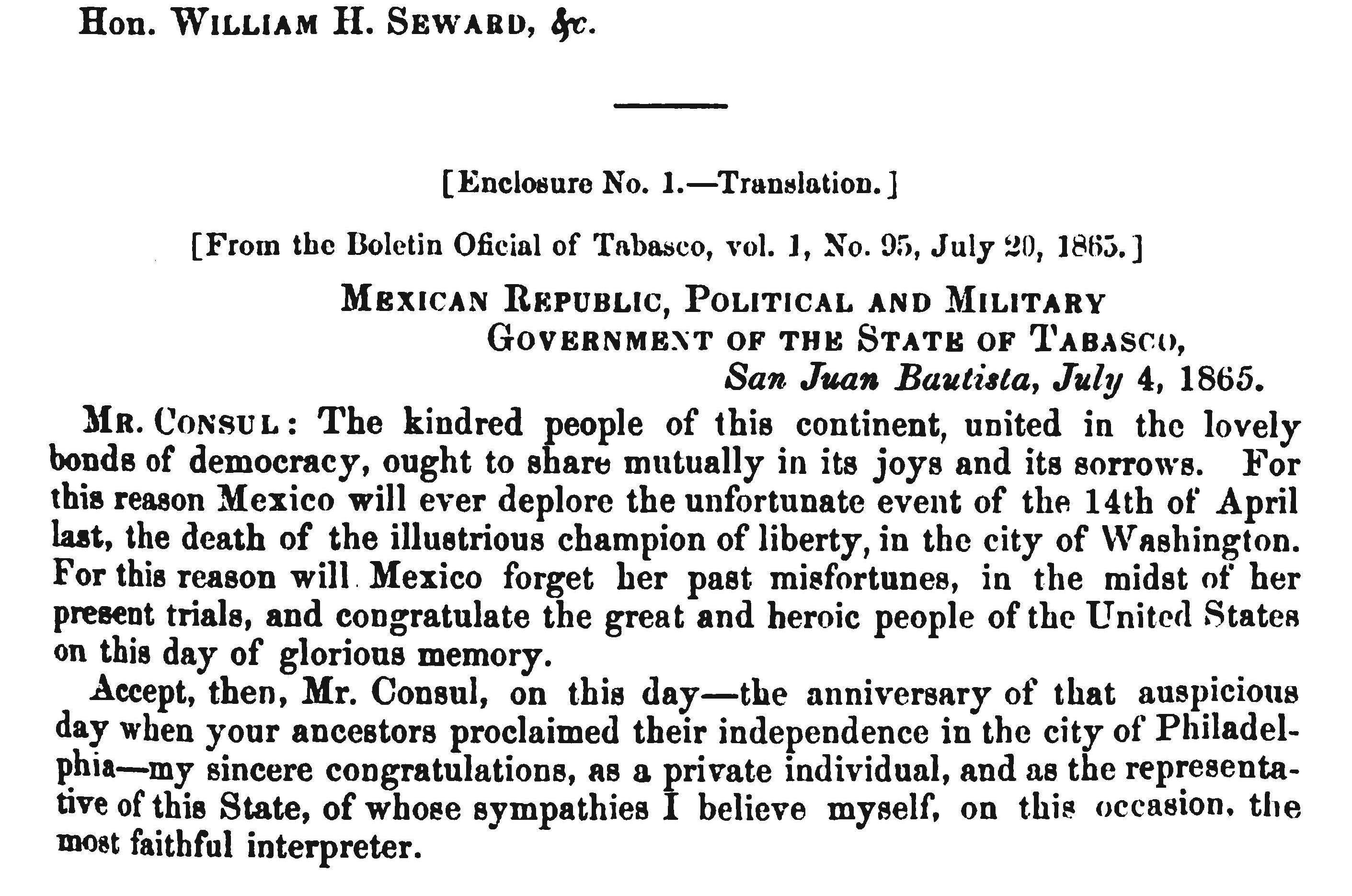
-
Description
This is a condolence letter from the governor of the State of Tabasco in Southern Mexico. The letter expresses how sad the Mexican government is because of the death of President Lincoln, but they also congratulate the government on winning the American Civil War. The letter discusses the importance of July 4, America's Independence Day, and the country's dedication to freedom and liberty. During the 1860s, Mexico was also in the midst of war. Benito Juarez served as President in Mexico until 1863, when French forces invaded Mexico during the "French Intervention" which began in 1861. The French, backed by conservatives and nobility in Mexico, tried to overthrow Mexican President Benito Juarez. Allies of Juarez fled to New York City, considered a safe haven by Mexican liberals. Juarez set up his government in exile in northern Mexico, in Chihuahua City. This letter tries to solidify the relationship between the exiled government and the American government by reinforcing their shared beliefs and good will.
-
Source
Google Books
-
Rights
This item is in the public domain and may be reproduced and used for any purpose, including research, teaching, private study, publication, broadcast or commercial use, with proper citation and attribution.
-
Creator
G. Mendez
-
Publisher
Government Printing Office
-
Date
July 4, 1865